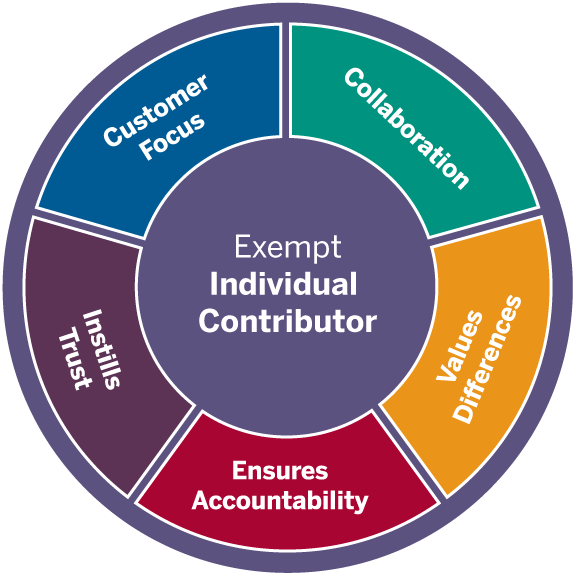Exempt Individual Contributor: Core
Communicates Effectively
Developing and delivering multi-mode communications that convey a clear understanding of the unique needs of different audiences
Good communication results in mutual understanding, harmony, and action. Poor communication wastes time and resources, hinders goal accomplishment and sours relationships. Effective communicators provide a clear message that is understood by everyone in the audience. They are attentive listeners who are open to other’s ideas.
You show this competency when you:
- Are effective in a variety of communication settings: one-on-one, small and large groups, or among diverse styles and position levels
- Attentively listen to others
- Adjust to fit the audience and the message
- Provide timely and helpful information to others across the organization
- Encourage the open expression of diverse ideas and opinions
How to develop this competency:
Quiet down and listen
Energy can be engaging, but if you are too loud or talkative, you may alienate more quiet or task-focused colleagues. If you are naturally outgoing, practice a little self-observation or ask others what they see. Balance speaking with listening. Do you tend to speak more in meetings than everyone else? Are you always the first to answer a question or offer an opinion? Hold back. Let others speak first.
Watch your non-verbals
Non-verbal communication can cause distractions or send unintended signals like impatience, disinterest, or nervousness. To clean-up your non-verbals, give others your full attention. Turn away from your computer, turn off your phone, and set distractions aside. Keep your facial expressions open and friendly. Avoid fidgeting. Stay focused and have good eye contact. Ask a few trusted friends what they’ve observed.
Adjust for individual differences
A lot of miscommunication occurs because people process information differently. Don’t assume that everyone processes information like you do. Get to know the communication style of those around you. Investigate what’s worked before. What techniques do they like? What holds their interest? What level of detail have they asked from others? Research your audience and tailor your approach.
Learn more:
- Article: Seven communication skills you need to succeed in the workplace
- Video: TED: How Generational Differences Hold Us Back at Work
- Book: Simply Said: Communicating Better at Work and Beyond by Jay Sullivan;
- Book: Listen! The Art of Effective Communication by Dale Carnegie and Associates (IU Skillport Book)
- LinkedIn Learning: Communicates Effectively course collection

Exempt Individual Contributor
